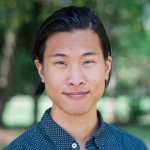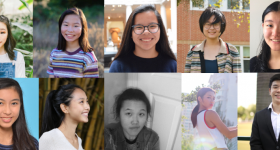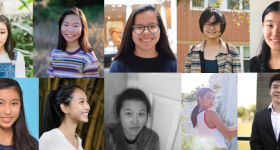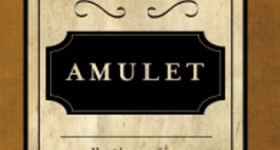For any person of color, living in America involves constantly being gaslit.
Call out a callous comment? You’re being too sensitive. Call out a slur? You’re making things up. Protest police brutality and murder? You’re focusing on the wrong issue.
“Minor feelings,” according to Cathy Park Hong, are the emotions one feels in response to this kind of gaslighting: “Basically the shame or melancholy or anxiety or frustration you might feel when you're living in a dominant culture that doesn't recognize your racialized reality.”
The term serves as the title of her most recent book released in February 2020, a collection of essays and her first work of nonfiction. In essays on topics ranging from the viral video of David Dao being dragged off a United flight to the genre-revolutionizing stand-up of Richard Pryor, Hong peels back the curtain of contemporary culture and paints an illuminating vision of race in the American experience.
“Where racism is being dismissed so constantly that you begin to second guess yourself when you have the proof that is your life,” she says.
Hyphen spoke to Hong in April about her book, anti-Asian American racism, and how to write without seeking approval from the white reader. The following is an edited transcript.
How do you feel your book has been impacted by COVID-19?
Cathy Park Hong: It's not as if anti-Asian racism didn't exist before. It's been around since the first Asian immigrant landed in America, but it has taken different strains. Sure, sometimes it's been more dormant in other periods. Usually, at least for East Asians, we tend to be invisible. I was dealing with those racial stereotypes in the book, and I wasn't anticipating that there would be this virulent, violent anti-Asian racism, but I'm not surprised either.
This is just the way that this country works. When there is a crisis, they tend to scapegoat a marginal group. With 9/11, it was South Asians and Middle Easterners. Just a few months ago, it was undocumented people and immigrants. It's like playing musical chairs. At a certain point, it's going to be your group.
So maybe I was surprised by the timing of it, how months after my book came out suddenly there's a surge of hate crimes against East Asians. However, if we're looking at the long view, in an overview of American history, it's not surprising; it's just another iteration of the problem.
People like to think that racism is going away, and things are getting better. Maybe that thought was more prevalent during Obama's time, not so much Trump's time. But it's also not that new; I experienced the same thing as a kid. People saying "chink" and telling me to go back to China. Even though I'm not from China. It's like everything I heard in childhood coming back to me, and it's frightening. I think I had a sort of coastal naiveté where I thought, "Oh I'm in Brooklyn, and it won't be as bad." But a lot of the hate crimes have been happening in New York City and Brooklyn and San Francisco.
The presence of Black culture, literature and criticism threads the entire book, including a lengthy chapter on Richard Pryor. How long did it take to transcribe Richard Pryor and what did you learn?
It took me a long time. I would do it for a month and then take a break. I would spend a few hours to transcribe a performance and then I would just not do it for a couple months. I would transcribe his audio files, and it was tedious, but then I was in a strange state of mind back then and it was something to do. And then I also had my research assistant do it too, but I'm sure I didn't get all of it.
It was a way of me just learning from him, absorbing his technique, humor and politics. Listening to him and transcribing him. I was trying to figure out what to do with it. Maybe I could write poetry inspired by it, but it felt wrong and inappropriate to do that, so that material just kind of sat there for a long time and eventually I just started to write about Pryor.
How is Black history intertwined with Asian American history?
I don't see how you can avoid the relationship. If you're going to be honest, if you're really going to tackle Asian American history in this country, I don't see how you can really talk about it without talking about African American history because we've always been used as a wedge between whiteness and Blackness, and we were always used as a harmful counterexample to African Americans. That was why the model minority myth was created; so that we would be the "good" minority as opposed to African Americans who were the "bad" minority.
The way that Americans look at race still is very much black and white, and everyone else, if you’re Asian American or Latinx or indigenous or Middle Eastern, you tend to slip through the cracks. You have to contend with both poles.
Since I grew up in L.A. and lived in L.A. during the L.A. riots, I couldn't avoid that history even if my family wasn't directly affected by it. The riots are always on my mind. And it really informed the way I thought about race relations and the very fraught relationship between African Americans and Korean Americans.
When people think about race, they think about Asians against whites or African Americans against whites or Muslims against whites, but there's a lot of miscommunication and conflict between Blacks and Asians. A lot of Asians are anti-Black. A lot of African Americans may think that Asians are the model minority who consider themselves white. I think that bridge needs to — and it has been built as I write about — but it needs work.
In order to struggle against white supremacy, there needs to be some kind of alliance, some kind of mutual aid. A lot of the book is informed by race theory and a wide variety of writers who write about their racial identity. African Americans have had a very long history of illustrious writers and thinkers whom a lot of people of color are indebted to, so it was important to acknowledge them as well.
In one essay, “An Education,” you describe at length your friendship with two other Asian American women in college. What was the importance of those friendships and, by extension, what is the importance of having AAPI community?
Well, it's solidarity, but I didn't think of it as solidarity; they were just my friends. It's just comfortable hanging out with my Asian friends and making jokes about our fucked-up families and knowing that they weren't going be like, “Whoa, what was that like?”
It's comfort and kinship. The first step to not being alienated is to find someone else who has a shared experience and to have that experience recognized and acknowledged. To have someone say, "I've experienced that as well," really makes you feel more human.
I write about it in my book and I don’t idealize it. The friendships that I had were very dysfunctional. And I think that this is just the nature of friendships and maybe female friendships — that there's always going to be some level of toxicity and I thought it was important to show that too.
It would be boring to me to try to put a screen in front of it and say, “Oh, look at all of my amazing friends and we have such a good relationship and blah, blah, blah.” Writing the traumatic parts of the friendships showed the realness of how we interact with each other. That was really important to me to show friendship between Asian American women in all its reality. This is who we were, and I'm not going to sugarcoat it.
Where are some of the cracks in Asian American solidarity right now?
I don't want to make generalizations, but I think some of us are pretty recent immigrants. Some of our parents came from war and very hard places, so they have a survival instinct. And the survival instinct is just to get by, to get what's yours and to not meddle with politics or waste your time with art. I definitely grew up with that kind of background, and we have to unlatch ourselves from that. We need to be much more community-minded rather than thinking of the net worth of just ourselves and our immediate family.
How do creators and writers avoid trying to prove their existence to a white audience?
Don't write for them. Write for who you want to write for. For Asian Americans, for African Americans, your sister, your best friend or your lover. Or write to yourself. Your younger self, your self 30 years from now.
Show you don't have anything to prove, that you're going to write what you want to write.
To just not play the game at all, avoiding it.
I wouldn't say avoiding it. It is a way of dismantling it or showing that there's a different way to write more experiences. I think that there are a lot of really exciting writers coming out now who are doing that. There's a template, sure, but there are more and more Asian American writers and people of color undermining the template that’s given to Asian American writers and other writers of color, so I think that we're in a special time. There's actually been a real explosion of Asian American novelists and poets who have been coming out last year and this year.
It's really too bad that the pandemic has been happening and that there's been all this anti-Asian racism. I'm really hoping that those stories will be read so that people will have a more complicated idea of who we are.










Comments